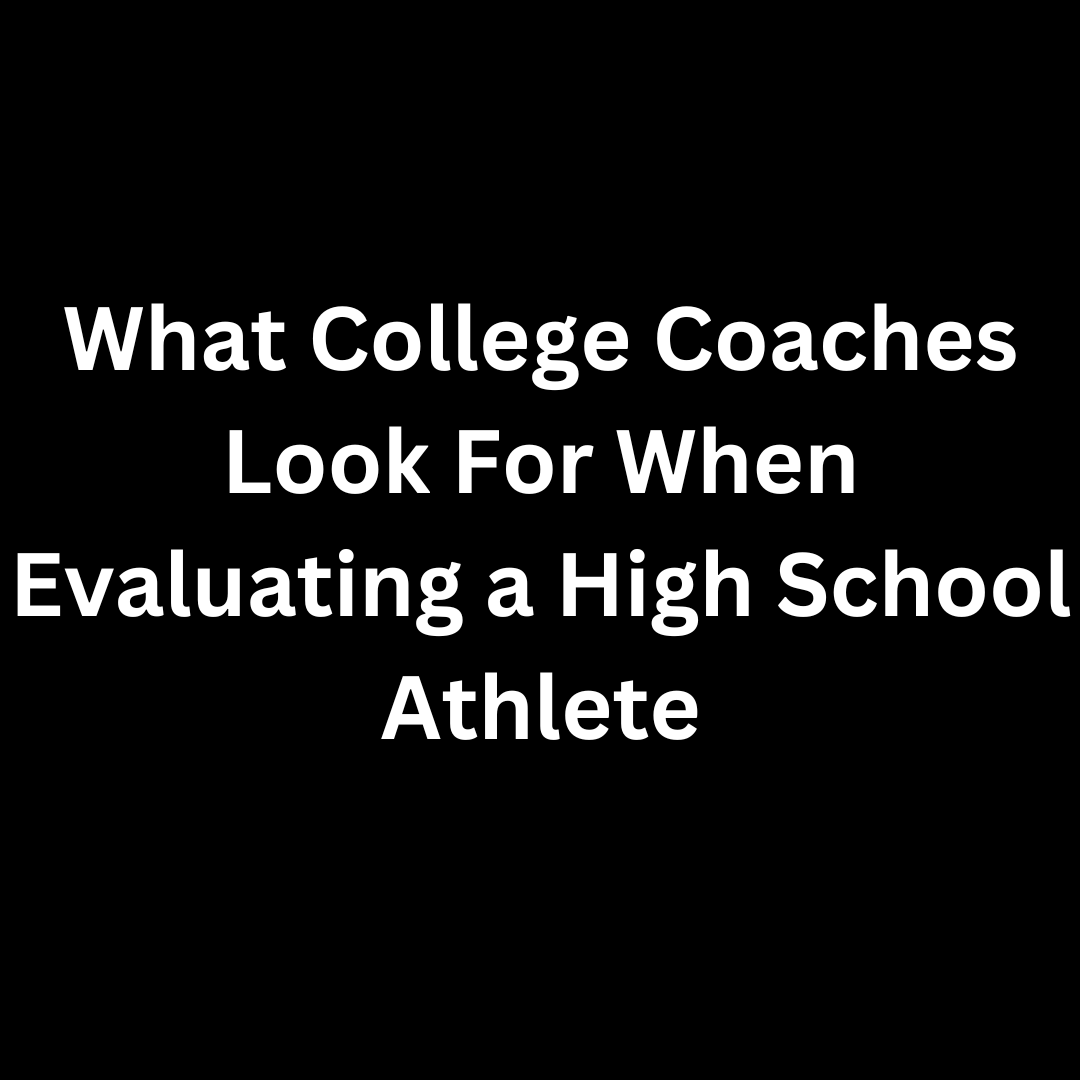For many high school athletes aspiring to compete at the collegiate level, the question looms: What are college coaches really looking for in recruits? While talent is undeniably important, it's only part of the equation. College coaches evaluate potential recruits on a range of factors that go beyond athletic performance. Understanding these can help athletes improve their chances of standing out during the recruiting process.
Here’s a breakdown of what college coaches typically look for when evaluating high school athletes:
1. Athletic Ability and Potential
At the heart of recruiting, coaches are evaluating your athletic ability. They want to see if your current skill set can transition to the next level and whether you have the potential to grow into a key player for their program.
What Coaches Look For:
- Physical attributes: Size, speed, agility, strength, and athleticism are major considerations depending on the sport.
- Technical skills: Coaches assess your mastery of sport-specific skills such as ball control, footwork, shooting, or throwing mechanics.
- Versatility: Athletes who can play multiple positions or excel in various situations are highly valuable to coaches.
- Coachability: Beyond raw talent, coaches look for athletes who can take instruction and show consistent improvement.
How to Stand Out:
- Focus on developing your core athletic abilities through strength and conditioning programs.
- Work on refining your sport-specific skills, and consistently seek feedback from coaches to improve.
- Film your games and create a highlight reel that showcases your technical abilities in action.
2. Character and Attitude
College coaches want athletes who not only contribute on the field but also enhance the team culture. Your attitude, work ethic, and character are often what separate you from other talented players.
What Coaches Look For:
- Work ethic: Coaches value players who show up early, stay late, and consistently put in the work to get better.
- Mental toughness: How do you respond to challenges, adversity, or setbacks like losing, injuries, or benching? Coaches want resilient athletes.
- Leadership qualities: Whether you’re a team captain or lead by example, showing leadership on and off the field is key.
- Positive attitude: Maintaining a team-first mentality, demonstrating respect for coaches and teammates, and staying motivated are critical attributes.
How to Stand Out:
- Demonstrate leadership by taking initiative, both on your team and in other areas like academics or community service.
- Highlight instances where you’ve overcome adversity in your recruiting profile or in conversations with coaches.
- Show enthusiasm for the game and respect for your teammates and coaches in every interaction.
3. Academic Performance
Collegiate athletes must balance their athletic commitments with academic responsibilities. Coaches need to ensure you’re capable of handling the rigorous demands of both. If your grades don’t meet the required standard, you may not even be eligible for recruitment, no matter how skilled you are.
What Coaches Look For:
- GPA and standardized test scores: Your academic performance shows coaches that you can meet the university’s admissions standards and stay eligible to play.
- Course load: Coaches will look at the types of classes you’re taking. Honors, AP, or advanced courses indicate that you’re prepared for college-level academics.
- Time management: Coaches want student-athletes who can balance school, practice, games, and travel effectively.
How to Stand Out:
- Prioritize your academics and maintain a strong GPA. This is critical not only for recruitment but for securing scholarships.
- Develop strong study habits and work on time management to prepare for the demands of being a student-athlete.
- If your grades are lagging, seek help from tutors or academic support programs at your school.
4. Coachability and Growth Potential
Coaches want athletes who are receptive to feedback and capable of improving. It’s not just about how good you are now, but how much better you can become.
What Coaches Look For:
- Receptiveness to feedback: Can you take constructive criticism and apply it to your game?
- Improvement over time: Coaches look at your progress from season to season, indicating whether you have the potential for long-term growth.
- Attitude toward learning: Athletes who are eager to learn and ask for guidance often stand out.
How to Stand Out:
- Be open to feedback from coaches, trainers, and teammates, and implement changes to show growth.
- Demonstrate consistent improvement in your stats, skills, and performance over time.
- During camps, showcases, or meetings with college coaches, ask questions that show you’re eager to learn and develop.
5. Athletic IQ
Understanding the game and making smart decisions under pressure are critical at the collegiate level. Coaches are looking for athletes who have a high "athletic IQ," or the ability to read the game, anticipate plays, and execute the right decisions quickly.
What Coaches Look For:
- Game awareness: Do you understand strategies, formations, and play-calling? How well do you read the game or anticipate opponents’ moves?
- Decision-making: Can you make quick, effective decisions in high-pressure situations? Do you keep calm under pressure?
- Instincts: Coaches love athletes who seem to have a natural feel for the game—whether it's positioning, timing, or making the right play in the heat of the moment.
How to Stand Out:
- Study game film, not just of your own performance but of high-level competitors. Learn how they approach different situations.
- Focus on understanding the tactical side of your sport. Knowing the "why" behind plays can help you anticipate and react faster.
- During games, practice making smart, quick decisions under pressure.
6. Commitment to the Program
When recruiting, coaches are looking for players who are genuinely interested in their program and are likely to stay long-term. Frequent transfers can disrupt team cohesion, so coaches want athletes who are committed to their vision.
What Coaches Look For:
- Interest in the school: Are you truly interested in their program, or are you just exploring options?
- Team fit: Coaches want to know if your personality and work ethic align with the team culture.
- Long-term commitment: Coaches are more likely to recruit athletes they believe will stay for the full duration of their college career.
How to Stand Out:
- Research the schools and programs you’re interested in and be able to articulate why you’re a good fit.
- Show enthusiasm for the school during official and unofficial visits by asking insightful questions about the program’s vision and culture.
- Demonstrate loyalty and commitment in your current athletic and academic endeavors.
7. Highlight Videos and Game Footage
A great highlight video can be your foot in the door. Coaches often start by watching film to get an initial sense of your abilities. This is your chance to make a strong first impression.
What Coaches Look For:
- Consistency in performance: They want to see that you can perform well consistently, not just highlight a single good game.
- Variety of skills: Show that you can excel in different areas, whether it’s offense, defense, or special teams.
- Game-changing moments: Coaches are drawn to athletes who can make an impact when it matters most.
How to Stand Out:
- Create a highlight reel that showcases a variety of your skills and demonstrates your strengths.
- Include footage from actual games, not just practice sessions, so coaches can see how you perform under pressure.
- Ensure the video is high-quality and easily accessible to coaches through recruiting platforms, email, or social media.

